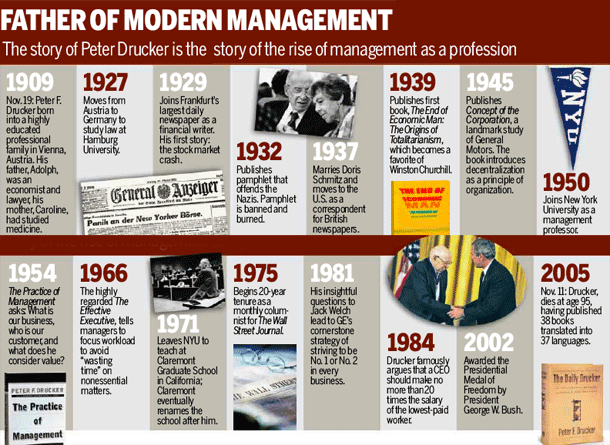Updated 03-Aug-2025
Peter Drucker is by far the most important management thinker of the 20th century. Even in 2010, his thinking and guidance is highly effective and has lost little of its lustre and value.
Contents
The Five Most Important Questions
Drucker formulated five "Most Important" questions to ask an organization. Each of them have subquestions which result. It is the answering of the questions together as a team which builds not only consensus but a shared understanding of what needs to be done.
- What is our Mission?
- Who is our Customer?
- What does our Customer Value?
- What are our Results?
- What is our Plan?
What is our Mission?
- Missions Are About Changing Lives
- It Should Fit On A T-Shirt
- Make Principled Decisions
- Keep Thinking It Through
Questions about the Mission
- What are we trying to achieve?
- What are the significant external or internal challenges, opportunities, and issues?
- Does our mission need to be revisited?
Who is our Customer?
- Identify The Primary Customer
- Identifying Supporting Customers
- Know Your Customers
Questions about the Customer
- Who are our customers?
- Have our customers changed?
- Should we add or delete some customers?
What does the Customer Value?
- Understand Your Assumptions
- What Does The Primary Customer Value?
- What Do Supporting Customers Value?
- Listen To Your Customers
Questions about What the Customer Values
- What do our customers value?
What are our Results?
- Look At Short-Term Accomplishments And Long-Term Change
- Qualitative And Quantitative Measures
- Qualitative measures
- Quantitative measures
- Assess What Must Be Strengthened Or Abandoned
- Leadership Is Accountable
Questions about the Results
- How do we define results for our organization?
- To what extent have we achieved these results?
- How well are we using our resources?
What is our Plan?
- Goals Are Few, Overarching, And Approved By The Board
- Objectives Are Measurable, Concrete, And The Responsibility Of Management
- Five Elements Of Effective Plans
- Abandonment
- Concentration
- Innovation
- Risk taking
- Analysis
- Build Understanding And Ownership
- Never Really Be Satisfied
Questions about the Plan
- What have we learned, and what do we recommend?
- Where should we focus our efforts?
- What, if anything, should we do differently?
- What is our plan to achieve results for the organization?
- What is my plan to achieve results for my group or responsibility area?
